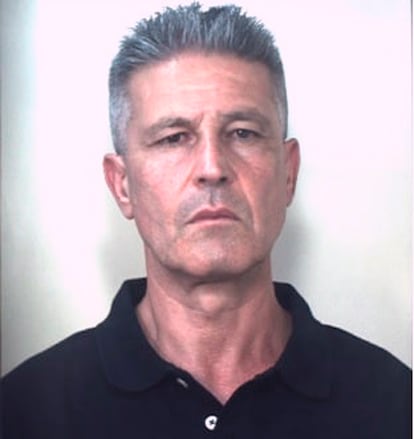Notorious ‘Ndrangheta boss arrested in Madrid
Domenico Paviglianiti, known as ‘the boss of bosses’ in the 1980s, was leading a quiet life in the Spanish capital after two years on the run from Italian authorities
Spanish police have arrested Domenico Paviglianiti, a mafia boss who is wanted by Italy’s authorities over numerous crimes. He is believed to be the instigator of nearly 130 murders.
Paviglianiti, 60, was detained on Tuesday in a joint operation with the Carabinieri after he walked out of the Madrid home where he was hiding. He had been on the run for nearly two years after being erroneously released early from an Italian prison in October 2019.
He is considered the head of one of the clans of the Ndrangheta, an organized crime syndicate based in the southern Italian region of Calabria that controls much of the cocaine trade in Europe. “Paviglianiti is among the top three fugitives wanted by the Italian justice system,” said an officer who participated in the operation.
The arrest comes on the back of a January request by Italian prosecutors in Bologna, who realized that Paviglianiti had fled Italy after being erroneously released too early from the prison where he was serving a 30-year sentence. A court this year handed him a further 11 years and eight months for murder and criminal association.

Investigators immediately looked to Spain, where Paviglianiti had been active in the 1980s and 90s. Sources familiar with the investigation said that the police initially focused on Barcelona, where one of his daughters was known to be from time to time. “They were never in direct contact with each other, only through intermediaries,” said an Italian officer. Authorities in Italy also learned through wiretaps that other relatives were planning to travel to Spain.
When the Barcelona investigation led to a dead end, police turned to Madrid. The suspect was found to be living on Don Quijote street, in the neighborhood of Cuatro Caminos, in an apartment shared with a Latin American woman and her teenage son. He remained under surveillance for several days, until the police were “99% certain” that the unassuming man in his sixties who appeared to be living a quiet, uneventful life was in fact a leading Italian mafia boss. Three officers were sent after him shortly after he walked out of the front door on Tuesday and Paviglianiti did not resist arrest, as evidenced by images shared by the police.
“He was a little heavier,” said Italian police sources, adding that members of the ‘Ndrangueta typically keep low profiles and make no statements when they are arrested “to avoid any wrong steps in their defense strategy.” Spanish police officers confirmed that “he was very calm and only said that this was all a mistake by the Italian authorities.” At the time of his arrest, he was carrying a fake Portuguese ID, a cellphone and €6,000 in cash. A search of his home turned up five more cellphones.
This is not the first arrest in Spain for the “boss of bosses,” as he was known in the 1980s. Paviglianiti was first held in Madrid in 1996 as part of an operation that brought down 16 other members of his organization. He was extradited to Italy to serve time for various crimes, including murder and drug trafficking, but had to be released after Spain’s Constitutional Court struck down the extradition in 2000. This decision was based on Pavigliniati’s claim that his right to defense had been violated when he was tried in absentia in Italy. The Italian justice system investigated whether the ‘Ndrangheta had unsuccessfully attempted to bribe a Spanish judicial sector worker with 70 million pesetas (€420,000) to buy their boss’ freedom.
Pavigliniati’s blood crimes go back to the days of clan warfare between 1985 and 1991 that resulted in around 700 deaths and redefined the hierarchy of the ‘Ndrangheta. In October 2020, another ‘Ndrangheta boss, Vittorio Raso, was mistakenly released following his arrest in Barcelona and immediately went missing.
English version by Susana Urra.
Tu suscripción se está usando en otro dispositivo
¿Quieres añadir otro usuario a tu suscripción?
Si continúas leyendo en este dispositivo, no se podrá leer en el otro.
FlechaTu suscripción se está usando en otro dispositivo y solo puedes acceder a EL PAÍS desde un dispositivo a la vez.
Si quieres compartir tu cuenta, cambia tu suscripción a la modalidad Premium, así podrás añadir otro usuario. Cada uno accederá con su propia cuenta de email, lo que os permitirá personalizar vuestra experiencia en EL PAÍS.
¿Tienes una suscripción de empresa? Accede aquí para contratar más cuentas.
En el caso de no saber quién está usando tu cuenta, te recomendamos cambiar tu contraseña aquí.
Si decides continuar compartiendo tu cuenta, este mensaje se mostrará en tu dispositivo y en el de la otra persona que está usando tu cuenta de forma indefinida, afectando a tu experiencia de lectura. Puedes consultar aquí los términos y condiciones de la suscripción digital.








































